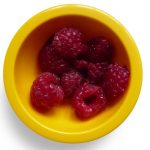Starting solid foods
Introducing solids is a big step in your baby’s development and it’s fun exploring new flavours and textures together.
When to start solid foods
 Your baby gets all the fluid, nutrients and energy they need from breast milk or formula – this is why it’s best to hold off introducing solids until they are around six months old. Their organs, in particular their gut, are developmentally ready at this time. Introducing solids at around six months will reduce the likelihood of baby developing eczema, asthma, hay fever and food allergies.
Your baby gets all the fluid, nutrients and energy they need from breast milk or formula – this is why it’s best to hold off introducing solids until they are around six months old. Their organs, in particular their gut, are developmentally ready at this time. Introducing solids at around six months will reduce the likelihood of baby developing eczema, asthma, hay fever and food allergies.
How to introduce solid foods
 Babies don’t need three meals a day at first, so you can start by offering them a small amount, at a time that suits you both. A good time to start is when baby is relaxed and not too hungry.
Babies don’t need three meals a day at first, so you can start by offering them a small amount, at a time that suits you both. A good time to start is when baby is relaxed and not too hungry.
Finger foods and baby led weaning
 Your baby can have a wide range of foods as soon as solids are introduced. Try introducing a range of soft finger foods. This could include various vegetables, fruit, carbohydrates such as potatoes or pasta, eggs, lentils and pulses and more.
Your baby can have a wide range of foods as soon as solids are introduced. Try introducing a range of soft finger foods. This could include various vegetables, fruit, carbohydrates such as potatoes or pasta, eggs, lentils and pulses and more.
Within a few months, your baby will also be able to manage harder foods like toast or strips of meat or fish.
Family foods
From six months you can also introduce family foods and encourage your baby to self-feed with their hands. Don’t worry about if they cause a mess, it’s normal and an important part of their learning!
If you do give family foods, these can have the same texture as your meals or it can be pureed. Do not add salt if you are giving family foods.
Introducing family meals and a range of finger foods can be a good way to introduce a range of tastes and textures. This supports your baby’s learning about food and helps them get a range of nutrients.
Cups and beakers for babies

It is a good idea to introduce a cup or beaker from around 6 months and offer sips of water with meals when you start introducing solids to your baby’s diet.
An open cup or a free-flow cup without a valve will help them learn to sip and is better for their teeth. It can be messy at first but slowly your baby will learn how to drink from an open cup.
From the age of 12 months they should be discouraged from drinking from a bottle. When using a bottle or trainer cup nothing other than breast milk, formula milk or water should be used. It is best to use cups that are free flowing, so that there is no need to ‘suck’. Sucking drinks from a teat or spout means the drink spends more time in contact with the teeth and this can lead to dental problems such as tooth decay.
Remember, the only drinks that are recommended for babies in the first year are breast milk or an appropriate infant formula and water.
Purees
In general, there is no need to introduce purees or mashed foods but some families might choose to introduce these, either on their own or alongside finger foods. If you choose to give purees, try to make them at home rather than buying them. Shop-bought baby foods often have a high water content and poor nutritional value.
How much food to give?
Don’t worry if your baby doesn’t seem to eat much. It’s normal for babies to just have a few mouthfuls throughout the day. They will still get all their nutrition from their milk feeds.
Gradually, you’ll be able to increase the amount and variety of food your baby eats. By 12 months, many babies will be having three meals a day and enjoying a wide range of tastes and textures.
Important
- Always stay with your baby when they’re eating in case they choke.
- Always halve whole grapes and strawberries before giving them.
- Do not give hard chunks of foods such as raw apple or carrot, and small hard foods such as nuts and popcorn.
- Always remove any pips, stones or tough skin.
- Your local children’s centre might have infant first aid classes that can build your confidence with this.
Further reading
UNICEF Start4Life guide to introducing solid foods
NHS Your baby’s first solid foods for advice on how to start solid foods and feeding your baby ad different ages.
The First Steps Nutrition Trust for healthy eating for infants, oder children and mums.
Healthy family workshops
Find out more about our Best Start with HENRY workshops.
View our HENRY timetable.

